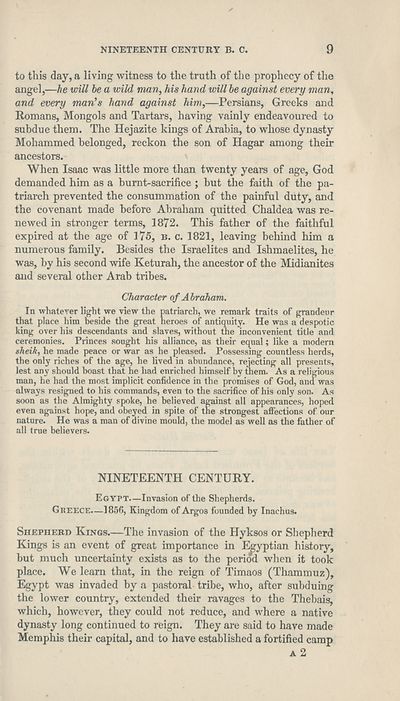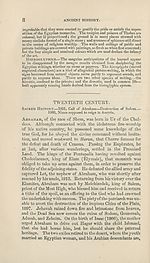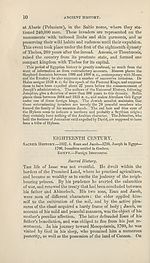Download files
Complete book:
Individual page:
Thumbnail gallery: Grid view | List view

NINETEENTH CENTURY B. C.
9
to this day, a living witness to the truth of the prophecy of the
angel,—he will be a wild man, his hand will be against every man,
and every man's hand against him,—Persians, Greeks and
Romans, Mongols and Tartars, having vainly endeavoured to
suhdue them. The Hejazite kings of Arabia, to whose dynasty
Mohammed belonged, reckon the son of Hagar among their
ancestors.
When Isaac was little more than twenty years of age, God
demanded him as a burnt-sacrifice ; but the faith of the pa¬
triarch prevented the consummation of the painful duty, and
the covenant made before Abraham quitted Chaldea was re¬
newed in stronger terms, 1872. This father of the faithful
expired at the age of 175, b. c. 1821, leaving behind him a
numerous family. Besides the Israelites and Ishmaelites, he
was, by his second wife Keturah, the ancestor of the Midianites
and several other Arab tribes.
Character of Abraham.
In whatever light we view the patriarch, we remark traits of grandeur
that place him beside the great heroes of antiquity. He was a despotic
king over his descendants and slaves, without the inconvenient title and
ceremonies. Princes sought his alliance, as their equal; like a modern
sheik, he made peace or war as he pleased. Possessing countless herds,
the only riches of the age, he lived in abundance, rejecting all presents,
lest any should hoast that he had enriched himself by them. As a religious
man, he had the most implicit confidence in the promises of God, and was
always resigned to his commands, even to the sacrifice of his only son. As
soon as the Almighty spoke, he believed against all appearances, hoped
even against hope, and obeyed in spite of the strongest affections of our
nature. He was a man of divine mould, the model as well as the father of
all true believers.
NINETEENTH CENTURY.
Egypt.—Invasion of the Shepherds.
Greece—1856, Kingdom of Argos founded by Inachus.
Shepherd Kings.—The invasion of the Hyksos or Shepherd
Kings is an event of great importance in Egyptian history,
hut much uncertainty exists as to the period when it took
place. We learn that, in the reign of Timaos (Thammuz),
Egypt was invaded by a pastoral tribe, who, after subduing
the lower country, extended their ravages to the Thebais,
which, however, they could not reduce, and where a native
dynasty long continued to reign. They are said to have made
Memphis their capital, and to have established a fortified camp
a 2
9
to this day, a living witness to the truth of the prophecy of the
angel,—he will be a wild man, his hand will be against every man,
and every man's hand against him,—Persians, Greeks and
Romans, Mongols and Tartars, having vainly endeavoured to
suhdue them. The Hejazite kings of Arabia, to whose dynasty
Mohammed belonged, reckon the son of Hagar among their
ancestors.
When Isaac was little more than twenty years of age, God
demanded him as a burnt-sacrifice ; but the faith of the pa¬
triarch prevented the consummation of the painful duty, and
the covenant made before Abraham quitted Chaldea was re¬
newed in stronger terms, 1872. This father of the faithful
expired at the age of 175, b. c. 1821, leaving behind him a
numerous family. Besides the Israelites and Ishmaelites, he
was, by his second wife Keturah, the ancestor of the Midianites
and several other Arab tribes.
Character of Abraham.
In whatever light we view the patriarch, we remark traits of grandeur
that place him beside the great heroes of antiquity. He was a despotic
king over his descendants and slaves, without the inconvenient title and
ceremonies. Princes sought his alliance, as their equal; like a modern
sheik, he made peace or war as he pleased. Possessing countless herds,
the only riches of the age, he lived in abundance, rejecting all presents,
lest any should hoast that he had enriched himself by them. As a religious
man, he had the most implicit confidence in the promises of God, and was
always resigned to his commands, even to the sacrifice of his only son. As
soon as the Almighty spoke, he believed against all appearances, hoped
even against hope, and obeyed in spite of the strongest affections of our
nature. He was a man of divine mould, the model as well as the father of
all true believers.
NINETEENTH CENTURY.
Egypt.—Invasion of the Shepherds.
Greece—1856, Kingdom of Argos founded by Inachus.
Shepherd Kings.—The invasion of the Hyksos or Shepherd
Kings is an event of great importance in Egyptian history,
hut much uncertainty exists as to the period when it took
place. We learn that, in the reign of Timaos (Thammuz),
Egypt was invaded by a pastoral tribe, who, after subduing
the lower country, extended their ravages to the Thebais,
which, however, they could not reduce, and where a native
dynasty long continued to reign. They are said to have made
Memphis their capital, and to have established a fortified camp
a 2
Set display mode to:
![]() Universal Viewer |
Universal Viewer | ![]() Mirador |
Large image | Transcription
Mirador |
Large image | Transcription
| Antiquarian books of Scotland > Education > Elements of universal history on a new and systematic plan > (29) |
|---|
| Permanent URL | https://digital.nls.uk/127580488 |
|---|
| Description | Thousands of printed books from the Antiquarian Books of Scotland collection which dates from 1641 to the 1980s. The collection consists of 14,800 books which were published in Scotland or have a Scottish connection, e.g. through the author, printer or owner. Subjects covered include sport, education, diseases, adventure, occupations, Jacobites, politics and religion. Among the 29 languages represented are English, Gaelic, Italian, French, Russian and Swedish. |
|---|

